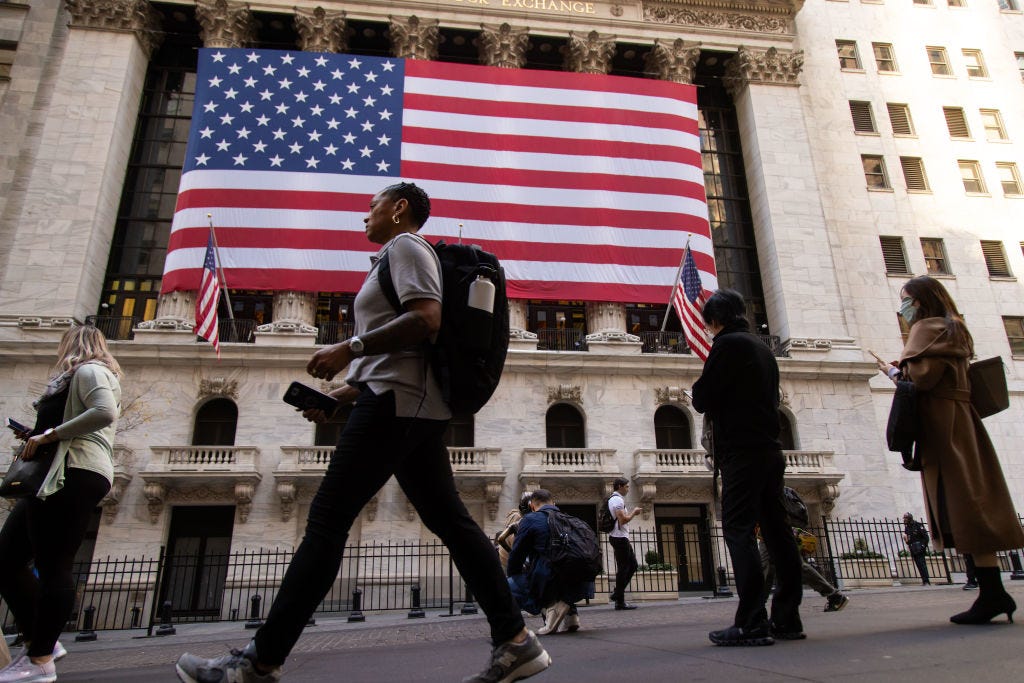Stock market ends mostly down. Nasdaq, S&P 500 dip for 4th day. Consumer confidence falls.

U.S. stocks ended mostly lower, with the broad S&P 500 and tech-heavy Nasdaq indexes falling for a fourth straight session as investors grow jittery about tariffs, the economy, inflation, and lofty artificial intelligence expectations.
Consumer confidence fell in February for the third consecutive month, the Conference Board said. Its consumer confidence index dropped to 98.3 from January's 105.2 and below a Dow Jones average forecast from economists of 102.3. It also marked the largest decline since August 2021.
"Consumers who fear the impact of higher tariffs, spending cuts, and deportations are getting worried and are likely to be more cautious," said Bill Adams, chief economist at Comerica Bank.
The S&P 500 dipped 0.47%, or 28 points, to 5,955.25; the blue-chip Dow rose 0.37%, or 159.95 points, to 43,621.16; and the Nasdaq dropped 1.35%, or 260.54 points, to 19,026.39, bringing the index to a one-month low and into negative territory for the year. The benchmark 10-year yield fell to 4.294%, the lowest level since December as investors sought safety.
Tariffs, inflation and AI unknowns
Markets are also at the mercy of President Donald Trump's constant tariff threats.
On Monday, Trump said broad tariffs on imports from Canada and Mexico “will go forward” when a monthlong delay on their implementation expires next week. Most economists fear sweeping tariffs would re-stoke inflation that the Federal Reserve has not yet fully tamed.
The Fed's preferred inflation gauge -- the personal consumption expenditures prices paid index -- used to determine interest rate policy is due Friday morning. On average, economists forecast the inflation measure to dip to 2.5% in January from December's 2.6%, but that's still above the Fed's 2% goal and some economists fear tariffs could move inflation in the wrong direction again.
Investors will also be keen to see earnings from semiconductor and AI darling Nvidia on Wednesday after the market close. It will be Nvidia's first earnings report since China's competitive DeepSeek AI model was said to have been built on a shoestring budget, throwing into question whether U.S. companies' massive AI spending spree was necessary or would be profitable. Nvidia shares have surged in the past year because its chips power AI.
Corporate news
While investors wait for Nvidia's earnings on Wednesday, they've been digesting the day's company news, including:
- Tesla shares sank more than 8%, dropping the EV maker's valuation below $1 trillion, after the company's European sales tumbled 45% even as other car makers saw increases.
- Hims & Hers Health shares tumbled more than 22% for its worst one-day performance ever after the company reported after Monday's close better-than-expected fourth-quarter results but disappointing gross margins. Investors also remained concerned about the fate of its Ozempic alternatives, which sold well when there was a shortage of GLP-1 semaglutide medications like Ozempic and Wegovy. The Food and Drug Administration said on Friday the shortage had been “resolved.”
- Home Depot beat analysts' earnings forecasts for the last few months of last year and snapped an eight-quarter decline in same-store sales with an increase of 0.8%. However, there's still "uncertainty over consumer confidence, spending power, and the impact of tariffs," said Neil Saunders, managing director of GlobalData. "The reality is that Home Depot is squeezed between a need to increase prices and a necessity to respond to subdued consumer demand and the increased desire for value. The near-term upshot of this will be a compressed bottom line." Shares of the home improvement retailer rose almost 3%.
- Zoom shares dropped about 8.5% after the video conferencing company issued revenue guidance that missed analysts' forecasts.
- Cleveland-Cliffs missed analysts' estimates for the last few months of last year. Shares of the steel maker slid about 3.5%.
- Chegg shares lost almost a third of their value after the education company said it was considering a sale or take-private deal.
Cryptocurrency
Crypto-related stocks like Robinhood and Coinbase shares fell more than 8% and 6%, respectively, after bitcoin prices dropped below $90,000 to the lowest level in three months.
Strategy, formerly known as MicroStrategy, stock shed 11.41% despite the company saying late Monday it had recently bought more bitcoin.
Bitcoin also failed to find any upward momentum on news the Securities and Exchange Commission's dropping an investigation into Uniswap Labs, creator of the world's largest decentralized crypto exchange. The Wall Street Journal said the SEC doesn't plan to move forward with any enforcement actions. This comes after the SEC dropped a probe into Robinhood's crypto arm, reinforcing thoughts Trump's administration will keep a light hand on the crypto industry.
Bitcoin was last down 4.03% at $87,835.53.
The story was updated with new information.
Medora Lee is a money, markets, and personal finance reporter at Paste BN. You can reach her at mjlee@usatoday.com and subscribe to our free Daily Money newsletter for personal finance tips and business news every Monday through Friday.